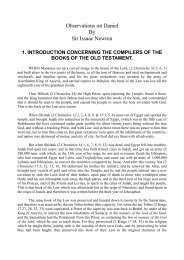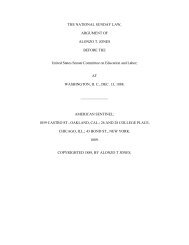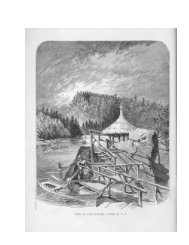Nazarenes_and Ebionites_Rogers.pdf - Friends of the Sabbath ...
Nazarenes_and Ebionites_Rogers.pdf - Friends of the Sabbath ...
Nazarenes_and Ebionites_Rogers.pdf - Friends of the Sabbath ...
Create successful ePaper yourself
Turn your PDF publications into a flip-book with our unique Google optimized e-Paper software.
aspects <strong>of</strong> <strong>the</strong> Old — <strong>and</strong> that, <strong>the</strong> Jewish Christians were <strong>the</strong> dominant<br />
element in Christianity until 70 A.D. [37]<br />
The years 70 <strong>and</strong> 135 A.D., were times <strong>of</strong> crisis for <strong>the</strong> <strong>Nazarenes</strong>. The next<br />
time <strong>of</strong> crisis came at <strong>the</strong> time <strong>the</strong> Roman emperor, Constantine, was baptized<br />
into <strong>the</strong> Catholic Church. An era <strong>of</strong> pagan persecution was passing away<br />
only to be replaced by <strong>the</strong> more terrible <strong>and</strong> prolonged persecutions by<br />
Christian Romans <strong>of</strong> any who would keep <strong>the</strong> law <strong>of</strong> Moses. [38]<br />
In <strong>the</strong> fourth-fifth century source attributed to <strong>the</strong> <strong>Nazarenes</strong> (or <strong>the</strong> remains<br />
<strong>of</strong> <strong>the</strong>m) by Shlomo Pines, <strong>the</strong> <strong>Nazarenes</strong> attack <strong>the</strong> Romans (Catholic<br />
Christians) for ab<strong>and</strong>oning <strong>the</strong> Mosaic law <strong>and</strong> for replacing it with different<br />
laws <strong>and</strong> customs. They also attack <strong>the</strong> Christology <strong>of</strong> <strong>the</strong> Catholic Church<br />
because <strong>of</strong> <strong>the</strong> emphasis on <strong>the</strong> person <strong>of</strong> Christ as opposed to <strong>the</strong>ir emphasis<br />
on Christ as prophet, proclaiming <strong>the</strong> coming <strong>of</strong> <strong>the</strong> Kingdom <strong>of</strong> God.<br />
Ano<strong>the</strong>r charge against <strong>the</strong> “Great Church” is that <strong>the</strong>y have replaced <strong>the</strong><br />
Fast (Day <strong>of</strong> Atonement) with o<strong>the</strong>r fasts such as Lent. The descendants <strong>of</strong><br />
<strong>the</strong> <strong>Nazarenes</strong> in this text fur<strong>the</strong>r take to task <strong>the</strong> “Church Fa<strong>the</strong>rs” for <strong>the</strong>ir<br />
idea about Christ doing away with <strong>the</strong> <strong>Sabbath</strong> <strong>and</strong> instituting Sunday<br />
observance. They explain that Christ came to magnify <strong>the</strong> law (here in regard<br />
to how to observe <strong>the</strong> <strong>Sabbath</strong>) not to change or to do away with it. The<br />
Council <strong>of</strong> Nicea was viewed as a death warrant for Jewish Christians. Any<br />
who would observe <strong>the</strong> <strong>Sabbath</strong> ra<strong>the</strong>r than Sunday were to be executed. [39]<br />
Under <strong>the</strong> sway <strong>of</strong> force — according to <strong>the</strong> text:<br />
“... people who pr<strong>of</strong>essed <strong>the</strong> religion <strong>of</strong> Christ came to do all<br />
that is reprehensible: <strong>the</strong>y worshipped <strong>the</strong> cross, observed <strong>the</strong><br />
Roman religious rites, <strong>and</strong> ate pork. Those who did not eat it<br />
were killed.” [39]<br />
Ano<strong>the</strong>r condemnation <strong>of</strong> <strong>the</strong> Roman Church was that <strong>the</strong>y had<br />
taken <strong>the</strong> Roman <strong>and</strong> Greek feast, called <strong>the</strong> “Nativity <strong>of</strong> Time,” which<br />
celebrated <strong>the</strong> return <strong>of</strong> <strong>the</strong> sun in January, <strong>and</strong> had introduced various<br />
modifications into it <strong>and</strong> called it <strong>the</strong> “Nativity <strong>of</strong> Christ” (later observed in<br />
<strong>the</strong> West on December 25 — “ Christmas”). The text denounces many<br />
additional customs in <strong>the</strong> Christian churches as pagan. [39]<br />
It is interesting that <strong>the</strong> same period as <strong>the</strong> writing <strong>of</strong> this text, is also that <strong>of</strong><br />
John Chrysostom’s anti-Jewish sermons in Antioch, in which, he vehemently<br />
denounced <strong>the</strong> Judaizing tendencies <strong>of</strong> Christians who celebrate <strong>the</strong> Jewish
















